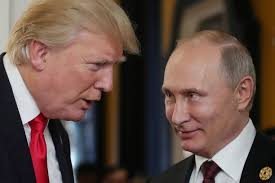The autocrats

Good summary from former ambassador to Russia Michael McFaul of how the Trump regime is in most ways now indistinguishable for a stereotypical autocracy:
For those of us who study autocracies, including elections in autocracies, there were a lot of familiar messages, symbols, and methods on display this week at the #RNCConvention.
1. Cult of the Personality. This show was all about Trump. ( 3 years after the death of Stalin, Khrushchev’s gave his secret speech in 1956, titled “On the Cult of Personality and Its Consequences.” I wonder if a future GOP leader will give a similar speech someday?)
2. Administrative resources. Autocrats and semi-autocrats frequently use government resources for personal electoral gain. We have #HatchAct to prevent such behavior in the U.S. It’s obviously not working.
3. Blatant disregard for the law. That Trump’s team dared anyone to charge them with violating the #HatchAct is exactly what Putin and others autocrats do all the time. Laws don’t apply to the king & his court, only to the subjects
.4. Blatant disregard for facts. As U.S. ambassador to Russia, I found this Putin regime trait most frustrating. We – the U.S. government- were constrained by facts. They were not. Trump obviously was not constrained by facts last night. He usually isn’t: amazon.com/gp/product/B08…
5. Us versus Them populism. “Elites” versus “the people” nationalism. Autocratic populists use polarizing identity politics to divide societies all the time. Many populist leaders actually have little in common with the “masses.” (Putin is very rich.)
6. The opposition is the “enemy of the people.” Putin & other autocratic populists cast their opponents as radicals & revolutionaries. They don’t focus on their own records – often there is little to celebrate – but the horrors that will happen if they lose power. Sound familiar?
6b. There is one difference between Putin and Trump so far. Putin also claims falsely that his political opponents are supported by foreign enemies, the U.S. & the West. Trump has not gone there full-throated yet. But my guess it’s coming. “Beijing Biden” is a hint.
7. Law and Order. Autocratic populists all shout about it, even when the opposite is happening on their watch.
8. The good tsar versus the bad boyars. Kings and tsars always blamed bad provincial leaders for national ills. Putin blames the governors all the time… just like Trump.
9. Individual acts of royal kindness. Putin, like the tsars he emulates, does this all the time. Trump offering a pardon or “granting” citizenship (which of course he didnt & doesn’t have the power to do) are typical, faux gestures of royal kindness toward his subjects.
10. Homage and fealty. Vassals must signal their complete loyalty and absolute devotion to kings and autocrats. Those that don’t are banished from the royal court or the party. (Where were the Bushes last night?)
11. The royal family. In this dimension, Trump acts more like a monarch than even Putin. (but watch Lukashenko and his gun-toting teenage son in Belarus)The many Trump family members who performed this week – even a girlfriend got a slot – went beyond even what Putin does.
12. There’s still one big difference. We still don’t know who will win the November election. That uncertainty is a crucial difference between electoral democracies & electoral autocracies. Its also a difference that has no guarantee of lasting, depending on the outcome this year.
His final point is disturbing to put it mildly. A genuine autocrat will not allow the system to vote him out of office. That is a contradiction in terms. Is the US a genuine autocracy yet? We don’t know, because we don’t know yet if there’s going to be a legitimate election in a few weeks.
Zack Beauchamp summarizes yet again (it can’t be repeated often enough) how the RNC illustrated the essential Republican strategy: lie about everything all the time, while breaking the law openly and flagrantly, and still demanding to be treated as a normal political party in a functioning liberal democracy. It isn’t and we aren’t.
Of course, politicians have always lied and misled the public. But in the past, they generally would try to avoid the Trumpian volume of blatant and overt falsehood, favoring clever spin and shading over outright lies whenever possible. Fact-checking worked because, in theory, politicians could be shamed by being called out as liars.
But the Trump-Cotton Republican Party doesn’t care about being shamed. They have become so disdainful of the essentials of political practice in a democratic society — a baseline attachment to the rule of law and honesty in political discourse — that they mock the very idea of accountability on these questions. They count on the sheer volume of misinformation — “flooding the zone with shit,” in Steve Bannon’s memorable phrase — to overwhelm our political institutions’ ability to check their misbehavior.
In short, they count on making us all exhausted — beating us over the head so heavily and consistently with lies that we feel abused into treating them like a normal party, debating normal things like whether their “law and order” message will resonate with median white voters in Wisconsin.
But this convention was rotten, from top to bottom. Engaging with it as a serious political event, rather than an extended exercise in dishonesty and lawbreaking, is to grant it legitimacy that it does not deserve.
In the simplest terms, every piece of journalism about it that doesn’t make it clear to readers that the GOP is now a fascist party is itself a form of collaboration with fascism.


